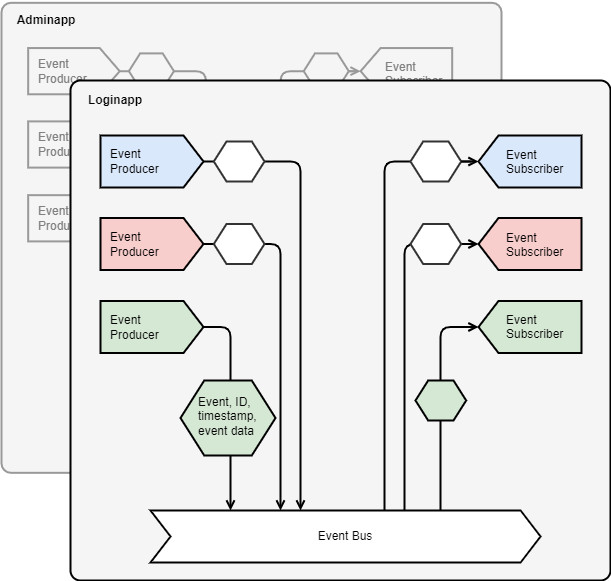Events and notifications
Event-based subscriber notifications
The IAM modules Adminapp and Loginapp produce events on various occasions. Events are (Java) objects instances that are aimed to be processed asynchronously by an event subscriber. Any of the available events can be consumed by an Event Subscriber to send an e-mail, an SMS or forward information to a REST API.
Example
Example:
A User Locked event can be used to trigger an e-mail to inform an end-user that his or her account has been locked. The content of event-triggered e-mails may contain further information to inform and support the user.
By design, the event bus is limited to the boundaries of the module (Adminapp or Loginapp) as shown in the illustration below:
Note that:
- An event must be consumed within the same module. It is impossible to produce an event in the Loginapp and consume it in the Adminapp.
- Some events, e.g.,
User Locked, can be triggered by producers in both the Loginapp and the Adminapp. To consume all these events, separate subscribers must be configured in both the Loginapp and the Adminapp. - Events are not stored. If an error occurs during the handling of an event, the event is lost.
- Events are asynchronous. Once the producer creates the event, it will continue processing. No response is expected.
- In the Loginapp, every flow step generates a Generic Step Result event upon completion. Since the Generic Step Result event is limited to flows, it is preferable to use more specific events if possible.
Further links and information
- Event producers
- Event attributes
- Event subscribers
- Event notification configuration in the Loginapp
- Event notification configuration in the Adminapp
- Information about custom event subscribers can be found in the IAM Custom Development Guide. You can request the latest version of the IAM Custom Development Guide by opening a support ticket. See Techzone - Airlock support process) for more information.
